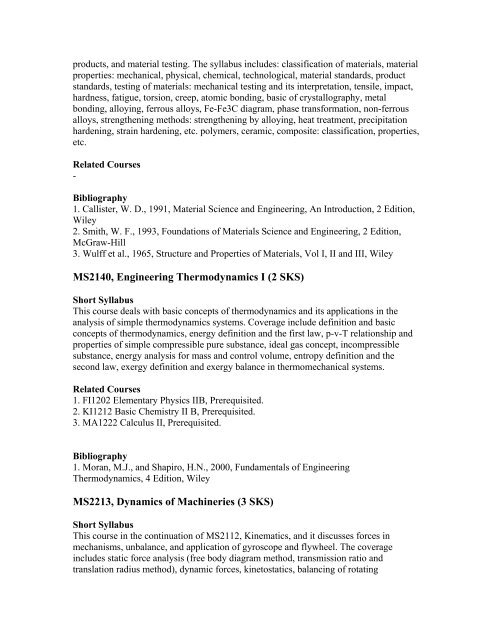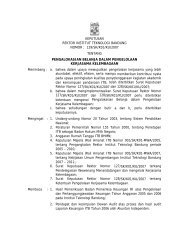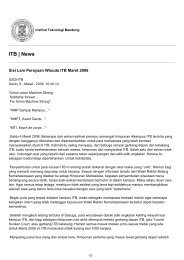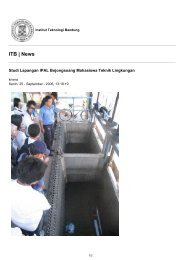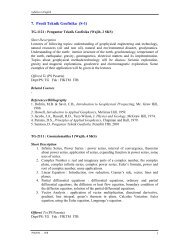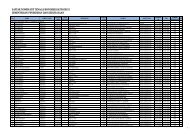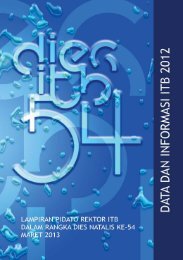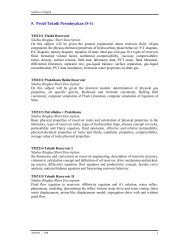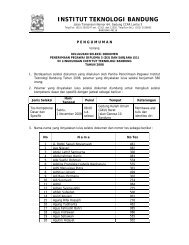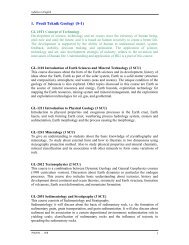Short Syllabus of Mechanical Engineering (131) Curriculum - ITB
Short Syllabus of Mechanical Engineering (131) Curriculum - ITB
Short Syllabus of Mechanical Engineering (131) Curriculum - ITB
Create successful ePaper yourself
Turn your PDF publications into a flip-book with our unique Google optimized e-Paper software.
products, and material testing. The syllabus includes: classification <strong>of</strong> materials, material<br />
properties: mechanical, physical, chemical, technological, material standards, product<br />
standards, testing <strong>of</strong> materials: mechanical testing and its interpretation, tensile, impact,<br />
hardness, fatigue, torsion, creep, atomic bonding, basic <strong>of</strong> crystallography, metal<br />
bonding, alloying, ferrous alloys, Fe-Fe3C diagram, phase transformation, non-ferrous<br />
alloys, strengthening methods: strengthening by alloying, heat treatment, precipitation<br />
hardening, strain hardening, etc. polymers, ceramic, composite: classification, properties,<br />
etc.<br />
Related Courses<br />
-<br />
Bibliography<br />
1. Callister, W. D., 1991, Material Science and <strong>Engineering</strong>, An Introduction, 2 Edition,<br />
Wiley<br />
2. Smith, W. F., 1993, Foundations <strong>of</strong> Materials Science and <strong>Engineering</strong>, 2 Edition,<br />
McGraw-Hill<br />
3. Wulff et al., 1965, Structure and Properties <strong>of</strong> Materials, Vol I, II and III, Wiley<br />
MS2140, <strong>Engineering</strong> Thermodynamics I (2 SKS)<br />
<strong>Short</strong> <strong>Syllabus</strong><br />
This course deals with basic concepts <strong>of</strong> thermodynamics and its applications in the<br />
analysis <strong>of</strong> simple thermodynamics systems. Coverage include definition and basic<br />
concepts <strong>of</strong> thermodynamics, energy definition and the first law, p-v-T relationship and<br />
properties <strong>of</strong> simple compressible pure substance, ideal gas concept, incompressible<br />
substance, energy analysis for mass and control volume, entropy definition and the<br />
second law, exergy definition and exergy balance in thermomechanical systems.<br />
Related Courses<br />
1. FI1202 Elementary Physics IIB, Prerequisited.<br />
2. KI1212 Basic Chemistry II B, Prerequisited.<br />
3. MA1222 Calculus II, Prerequisited.<br />
Bibliography<br />
1. Moran, M.J., and Shapiro, H.N., 2000, Fundamentals <strong>of</strong> <strong>Engineering</strong><br />
Thermodynamics, 4 Edition, Wiley<br />
MS2213, Dynamics <strong>of</strong> Machineries (3 SKS)<br />
<strong>Short</strong> <strong>Syllabus</strong><br />
This course in the continuation <strong>of</strong> MS2112, Kinematics, and it discusses forces in<br />
mechanisms, unbalance, and application <strong>of</strong> gyroscope and flywheel. The coverage<br />
includes static force analysis (free body diagram method, transmission ratio and<br />
translation radius method), dynamic forces, kinetostatics, balancing <strong>of</strong> rotating


